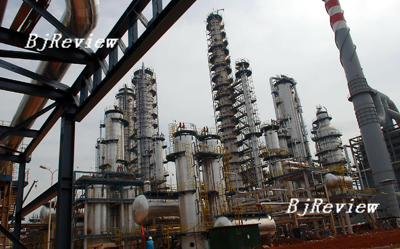
A State Council meeting on May 30, presided over by Premier Wen Jiabao, decided to carry out a pilot project to compile budgets for the management of state capital for enterprises owned by the Central Government. This decision will end a 12-year period during which 157 central state-owned enterprises (SOEs) led by Sinopec paid the government only taxes and no dividends.
The new operating budget system refers to a plan that would allow the government, as the controlling stockholder of SOEs, to recoup an appropriate portion of their huge profits and use the dividends to address issues concerning the daily life of common people.
The new budget system consists of factors concerning income and spending. A major source of income is derived from the dividends of exclusively state-owned enterprises with diversified operations. Another possible source of income would be from the sale of stocks of less vital enterprises. As for spending, the government will increase investment in SOEs vital to the lifeline of the economy, and write off the costs of bankruptcy and liquidation of other SOEs.
The detailed plan has yet to be introduced, but a proposal drafted by the Ministry of Finance about sharing dividends from SOEs has been submitted to the State Council for approval. According to the proposal, the collection of SOE dividends will be at a rate far less than the average dividend rate on the securities market.
Li Rongrong, Director of the State-Owned Assets Supervision and Administra- tion Commission (SASAC) who takes care of the 157 central SOEs, said they wouldn't design one solution for all the SOEs and would adopt different rates to reflect the variety of SOEs.
The budget plan will cover central SOEs supervised by the SASAC this year. Tobacco enterprises will be incorporated next year, and railway enterprises will not be covered for the time being.
Zero dividend
State-owned enterprises in Western countries all pay dividends to their respective central governments despite differences existing in profit appropriations. SOEs in China, however, are privileged and pay nothing in return for state investment. The Central Government offers these enterprises policy and budgetary supports even when it suffers from fiscal difficulties. This practice can be traced back to the 1994 tax reform that abolished the dual-tax system and adopted a single unified tax system for domestic and foreign companies. The goal of this reform was to promote market-oriented economic development.
After the tax reform, China gave up the dividends from SOEs, mainly because of a major change in funding SOEs. The SOEs used to rely on budgetary allocations for fixed assets investment and then had to secure loans from banks to invest in fixed assets and repay the loans and interest themselves. Besides this, SOEs shouldered part of the government's social security function for its employees. In the 13 years since the tax reform, the government has not asked SOEs for a portion of their profits.
With the establishment and improvement of the social security system and the deepening reform of SOEs, SOEs gradually turned the responsibility of providing social security benefits for employees back to the government, thus gaining vigor and strength in pursuing further development.
Statistics from the Ministry of Finance show that SOEs in China reaped total profits of 1.1 trillion yuan in 2006, of which over 770 billion yuan was attributed to central SOEs. According to the ministry, central SOEs will harvest over 800 billion yuan of profits this year, and the total amount will exceed 1.2 trillion yuan when taking account of local SOEs.
A majority of profits, however, are in the hands of central SOEs enjoying monopoly privileges. Of them, three oil giants, PetroChina, Sinopec and China National Offshore Oil Corp., accounted for half of the total profits of all central SOEs, with combined sales revenue in 2006 surpassing 2 trillion yuan. The two root causes for their skyrocketing profits were "the soaring prices of energy resources as well as their monopoly of the market," analyzed Liu Jipeng, professor with the Capital University of Economics and Business.
A disgruntled public has complained that such huge profits have not been submitted to the government for public benefits. In addition, central budgetary expenditures have kept subsidizing these enterprises in recent years. Sinopec, for instance, received 10 billion yuan in budgetary allocations when the international price of crude oil kept rising in 2005 and an additional 5.2 billion yuan from the Central Government at the end of 2006.
| 